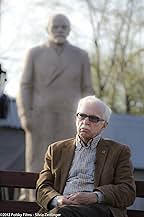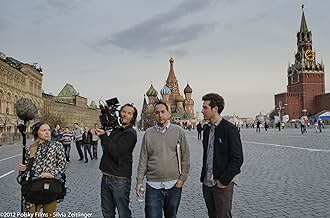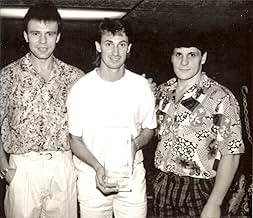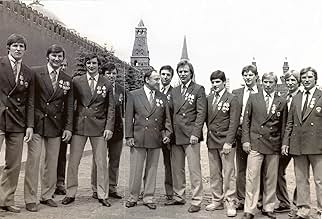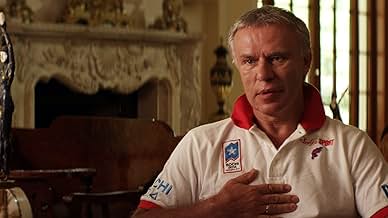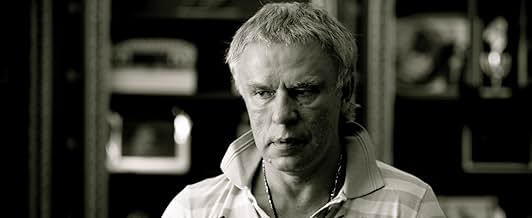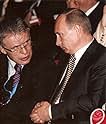IMDb-BEWERTUNG
7,6/10
7341
IHRE BEWERTUNG
Füge eine Handlung in deiner Sprache hinzuThe story of the Soviet Union's famed Red Army hockey team through the eyes of its players.The story of the Soviet Union's famed Red Army hockey team through the eyes of its players.The story of the Soviet Union's famed Red Army hockey team through the eyes of its players.
- Auszeichnungen
- 5 Gewinne & 11 Nominierungen insgesamt
Viacheslav Fetisov
- Self
- (as Slava Fetisov)
Herb Brooks
- Self - US Olympic Coach
- (Archivfilmmaterial)
- (Synchronisation)
Don Cherry
- Self - Hockey Commentator
- (Archivfilmmaterial)
- (Synchronisation)
Alan Eagleson
- Self - Hockey Agent
- (Synchronisation)
Empfohlene Bewertungen
Director Gabe Polsky uses his debut documentary Red Army to explore perhaps one of the most intriguing stories of hockey that has ostensibly swept under the rug in the modern day. Polsky tells the story of the Soviet Union's hockey team during the Cold War. He uses the captain of the Soviet's hockey team known as HC CSKA Moscow Viacheslav "Slava" Fetisov to paint the picture of an unstoppable hockey team that practiced ruthlessly and was kept under less than adequate conditions by their dictator of a coach.
Right of the bat, Fetisov is a cantankerous presence, thoroughly unpleasant to the audience and Polsky, going as far as to flip off Polsky whilst he plays on his phone in the middle of an interview. However, Fetisov finally gets the intriguing story out of him that we came for. He tells of a time when the Soviet Union selected hockey as the country's sport and how numerous young children would stand in line for hours on end to try out for the Soviet teams. The USSR was about unity and people saw hockey as a way to unite everyone through the spirit of a team and the desire to win at all costs.
The HC CSKA Moscow, better known by their name of the "Red Army," was a meticulously coached and organized team. Archival footage showing practices and actual games show a team hellbent on executing strategy, with slick, blink-and-you-miss-it puck passing amongst players, even in the tightest situations. One of Polsky's angles in the film is how there is a contrast between American hockey and Soviet hockey and that contrast is evident just by looking at a few clips of the Red Army in action. Where the Red Army was concerned with maintaining puck possession in the toughest situations, American hockey finds itself often preoccupied with checking and fighting.
The Red Army was coached by Viktor Tikhonov, the aforementioned ruthless coach. No player featured in Red Army has a particularly kind word to spare for Tikhonov, all of whom reflecting on some of his most frighteningly strict and demeaning moments. One player recalls how he wouldn't let a teammate visit his dying father back home, and another reflects on how players urinated blood because Tikhonov worked them so hard. Tikhonov believed in a dictatorship when it came to coaching hockey; he was also worried about players defecting or abandoning allegiance to the USSR in favor of playing for the NHL. If Tikhonov thought one of his players was planning to jump ship, no matter how skilled they were, he would cut them and blacklist them from hockey, all but guaranteeing they'd never get an opportunity to play in the NHL.
Those who did get the fortunate opportunity to play in the NHL, thanks to their unbelievable talent and skill, like Fetisov, a nineteen-year-old rookie named Alexandr Mogilny, and the talented center Sergei Fedorov, found themselves under an unrealistic amount of scrutiny for their decision. Fetisov, in particular, had to jump through a series of hoops in order to land the spot on the roster of the New Jersey Devils. Devils' manager Lou Lamoriello had granted an immense signing bonus to Fetisov but the Soviet Union refused to give up one of their most dynamic players. The Soviets saw players jumping ship for the NHL as a victory for the west and a grand loss for the USSR.
Red Army does a fine job at exposing the blurred line of sports and politics, showing how during the Cold War era, the two worked in conjunction with one another quite brazenly. Polsky works to keep this documentary on topic, although in only eighty-four minutes, and admittedly a great deal of ground to cover and characters to profile, it's difficult for Polsky to hit all his targets with complete development. It almost feels like this runtime was set before the documentary even began filming and he was prohibited from going over by even a minute. Still, this is a hearty documentary that houses a great deal of personality in its depictions of contrasting views and politics of the same sport and how politics itself got involved in a sport and resulted in a messy ordeal for many involved.
Directed by: Gabe Polsky.
Right of the bat, Fetisov is a cantankerous presence, thoroughly unpleasant to the audience and Polsky, going as far as to flip off Polsky whilst he plays on his phone in the middle of an interview. However, Fetisov finally gets the intriguing story out of him that we came for. He tells of a time when the Soviet Union selected hockey as the country's sport and how numerous young children would stand in line for hours on end to try out for the Soviet teams. The USSR was about unity and people saw hockey as a way to unite everyone through the spirit of a team and the desire to win at all costs.
The HC CSKA Moscow, better known by their name of the "Red Army," was a meticulously coached and organized team. Archival footage showing practices and actual games show a team hellbent on executing strategy, with slick, blink-and-you-miss-it puck passing amongst players, even in the tightest situations. One of Polsky's angles in the film is how there is a contrast between American hockey and Soviet hockey and that contrast is evident just by looking at a few clips of the Red Army in action. Where the Red Army was concerned with maintaining puck possession in the toughest situations, American hockey finds itself often preoccupied with checking and fighting.
The Red Army was coached by Viktor Tikhonov, the aforementioned ruthless coach. No player featured in Red Army has a particularly kind word to spare for Tikhonov, all of whom reflecting on some of his most frighteningly strict and demeaning moments. One player recalls how he wouldn't let a teammate visit his dying father back home, and another reflects on how players urinated blood because Tikhonov worked them so hard. Tikhonov believed in a dictatorship when it came to coaching hockey; he was also worried about players defecting or abandoning allegiance to the USSR in favor of playing for the NHL. If Tikhonov thought one of his players was planning to jump ship, no matter how skilled they were, he would cut them and blacklist them from hockey, all but guaranteeing they'd never get an opportunity to play in the NHL.
Those who did get the fortunate opportunity to play in the NHL, thanks to their unbelievable talent and skill, like Fetisov, a nineteen-year-old rookie named Alexandr Mogilny, and the talented center Sergei Fedorov, found themselves under an unrealistic amount of scrutiny for their decision. Fetisov, in particular, had to jump through a series of hoops in order to land the spot on the roster of the New Jersey Devils. Devils' manager Lou Lamoriello had granted an immense signing bonus to Fetisov but the Soviet Union refused to give up one of their most dynamic players. The Soviets saw players jumping ship for the NHL as a victory for the west and a grand loss for the USSR.
Red Army does a fine job at exposing the blurred line of sports and politics, showing how during the Cold War era, the two worked in conjunction with one another quite brazenly. Polsky works to keep this documentary on topic, although in only eighty-four minutes, and admittedly a great deal of ground to cover and characters to profile, it's difficult for Polsky to hit all his targets with complete development. It almost feels like this runtime was set before the documentary even began filming and he was prohibited from going over by even a minute. Still, this is a hearty documentary that houses a great deal of personality in its depictions of contrasting views and politics of the same sport and how politics itself got involved in a sport and resulted in a messy ordeal for many involved.
Directed by: Gabe Polsky.
You'll note that the only bad reviews so far are Canadian hockey fans upset that those too young to remember Russian Hockey dominance, will learn that Canada was never the defacto all Hockey rulers of the world as they like to claim. Fact is, Russia was the best in the world for quite some time. This is just a tough pill for Canadian hockey fans to swallow.
My only complaint is the interviewer did come off as amateurish and disrespectful. Outside of that, I thought the film was very introspective with lots of old footage of the former USSR. Excellent interviews. And to the guy complaining about no Tikhonov interview, it clearly stated at the end of the film that Tikhonov declined an interview request.
This is an excellent documentary. If you can put your patriotic homerism aside and respect it for what it is, you will enjoy it.
My only complaint is the interviewer did come off as amateurish and disrespectful. Outside of that, I thought the film was very introspective with lots of old footage of the former USSR. Excellent interviews. And to the guy complaining about no Tikhonov interview, it clearly stated at the end of the film that Tikhonov declined an interview request.
This is an excellent documentary. If you can put your patriotic homerism aside and respect it for what it is, you will enjoy it.
"Ninety percent of hockey is mental and the other half is physical." Wayne Gretsky
In Gabe Polosky's expert documentary, Red Army, the understanding of modern Russian hockey history filters through the influence of legendary coach Anatoly Tarasov. He taught young and old about how to play hockey like chess layered over with the best of communist collectivist philosophy—a blueprint for world-class teamwork dominance from 1954-91.
The star of this doc is Vyacheslav Fetisov ("Slava"), whose play, along with four other Russian teammates, dominated world hockey for years. His face full of character in middle age, his understanding of human nature, and his devotion to the best of what Russia could offer make for no-bathroom-break-allowed drama. His defection that results in losing his best friend, Kasatonov, is the stuff of real-life drama. Yes, there are arresting shots of hockey that seem more like perfect video games than the real-live action they are, but it's the humanity that make this film outstanding.
Slava is central-casting smart and handsome carrying an abiding love of the motherland conflicting with a heightened sense of things going wrong after the Cold-War halcyon days. To hear him extol the spirit of collective achievement is to put in relief our emphasis on individuality, for its strengths and weaknesses. Polosky does not belabor the good and bad of the competing systems but rather presents the victories and defeats as a matter of history and politics: "Draw your own conclusions," he might say.
That classic documentary "lack of bias" sometimes is frustrating. For instance, I would like to know how much of either ideology—American vs. Russian—plays in the "miracle" of the USA win at the 1980 Olympics in Lake Placid. Did the invulnerable Russian five suffer from their dislike of new coach Tikhonov's dictatorial ways (e.g., he wouldn't let a player leave to see his dying father!)? I need to go back, I guess, to another great doc, Miracle (2004), to see Kurt Russell play the legendary Herb Brooks and his victorious USA Olympic team. I suspect the reason for the Russian failure will be less apparent than the American victory.
I am nitpicking here because overall the film is exemplary historical reporting without forcing inferences about facile conjunction. Even if you're not a hockey fan, you'll delight learning about truly great players who came to America, eventually living the dream but not without a rocky adjustment as they learned to love individualism in a new country that didn't accept them as graciously as I would have expected.
See Red Army and be uncomfortably embarrassed. They were good guys.
In Gabe Polosky's expert documentary, Red Army, the understanding of modern Russian hockey history filters through the influence of legendary coach Anatoly Tarasov. He taught young and old about how to play hockey like chess layered over with the best of communist collectivist philosophy—a blueprint for world-class teamwork dominance from 1954-91.
The star of this doc is Vyacheslav Fetisov ("Slava"), whose play, along with four other Russian teammates, dominated world hockey for years. His face full of character in middle age, his understanding of human nature, and his devotion to the best of what Russia could offer make for no-bathroom-break-allowed drama. His defection that results in losing his best friend, Kasatonov, is the stuff of real-life drama. Yes, there are arresting shots of hockey that seem more like perfect video games than the real-live action they are, but it's the humanity that make this film outstanding.
Slava is central-casting smart and handsome carrying an abiding love of the motherland conflicting with a heightened sense of things going wrong after the Cold-War halcyon days. To hear him extol the spirit of collective achievement is to put in relief our emphasis on individuality, for its strengths and weaknesses. Polosky does not belabor the good and bad of the competing systems but rather presents the victories and defeats as a matter of history and politics: "Draw your own conclusions," he might say.
That classic documentary "lack of bias" sometimes is frustrating. For instance, I would like to know how much of either ideology—American vs. Russian—plays in the "miracle" of the USA win at the 1980 Olympics in Lake Placid. Did the invulnerable Russian five suffer from their dislike of new coach Tikhonov's dictatorial ways (e.g., he wouldn't let a player leave to see his dying father!)? I need to go back, I guess, to another great doc, Miracle (2004), to see Kurt Russell play the legendary Herb Brooks and his victorious USA Olympic team. I suspect the reason for the Russian failure will be less apparent than the American victory.
I am nitpicking here because overall the film is exemplary historical reporting without forcing inferences about facile conjunction. Even if you're not a hockey fan, you'll delight learning about truly great players who came to America, eventually living the dream but not without a rocky adjustment as they learned to love individualism in a new country that didn't accept them as graciously as I would have expected.
See Red Army and be uncomfortably embarrassed. They were good guys.
When we first meet Viacheslav Fetisov in the opening scene of "Red Army", he rather surprisingly gives his interviewer the middle finger. He's not going to be hurried - he's already seen everything; been everywhere and done it all to be rushed by some kid from California (or was it Chicago?) making a documentary about ice hockey. If he has to sort out some personal business by way of a phone call before he gets into the nitty-gritty of his life story, then he will.
This is all before he has even uttered a word of genuine substance. By the time he has stopped speaking, and the film has ended with his life as it was in aftermath of the 2014 Winter Olympics, we have surely been moved by a quite stupendous narrative depicting one man's journey through the very heart of the Russian ice hockey system at a time when it was looked upon by the Communist ideologues in the 1970's and 80's as a bulwark for internationalist reputation.
There is not, of course, any correlation between sporting success and kind; prosperous societies which are worth living in, but it is, as George Orwell once attempted to convey in a work which unfolded in a mock-USSR setting, the case that something certainly becomes true when enough people believe it - irrespective of whether that thing is true in reality.
Despite their terrifying nature, societies (and films about these societies) along the lines of the Soviet Union are, for whatever reason, often morbidly fascinating - more so once we know they have disbanded and can gawp on in awe at what life was like within them: don't tell me you've never found a documentary about Nazi Germany absorbing, or even more recently a programme about a television crew who were escorted around North Korea by government supervisors. "Red Army" is, in one sense, a piece along these lines, but it is predominantly more interested in the historical story of the development of Russian ice hockey to such an extent it became all but invincible, and the aftershock of the programme which it had on other ice hockey playing nations.
Going on what I read from those who lived there, the Soviet Union was not a good place to be: people were poor, but power brought you the privilege of a nice apartment and good healthcare; government officials were corrupt and could be bribed quite easily. The skylines were desolate and grey, scarred by buildings beyond repair. It was a society of lies and corruption, not one of peace; love; progress and equality. Its saddest story is the tale of young Pavlik Morozov, who grassed to the Stalinist authorities the fact his parents were hoarding grain. His parents were killed, and a statue went up in a town square of the boy who was seen as an example to all. The odd nature of the country and how its rulers secretly knew it was a bad place to be is nicely captured via a short story therein the documentary, which recalls how KGB agents would confiscate the passports of hockey players in order to prevent defections once they had arrived at their foreign destination. Why would anyone want to defect from the Soviet paradise?
The country's ice hockey, however, eventually became second to none and "Red Army" is the retrospective documentation of the process which had this come to be; a quite brilliant voyage through the Soviet system told from the perspective of many of the players involved in the team in conjunction with one or two supporting acts who played witness to the whole thing. Agonisingly, we are robbed of input from Viktor Tikhonov, the coach of the Soviet team whose team waltzed to so many gold medals and whose nerves must have been shredded every match as the weight of both his nation's ideology and standing bear down on him. Agonisingly, he died shortly after the release of the documentary anyway.
The documentary is expertly put together by, of all people, an American by the name of Gabe Polsky, who depicts how no one had played ice hockey before what the USSR brought to the game in the 1970's. It depicts them using the somewhat obscure combination of the rhythm of ballet and the tactical nous of chess to create a team which blasts their way into greatness, winning the vast majority of their finals and seemingly spoiling the lofty opinions certain western powerhouses had of themselves in the process. Do not let the tough nature of the sale put you off - this combination of the Soviet Union and ice hockey wrapped up into a documentary package works really well.
This is all before he has even uttered a word of genuine substance. By the time he has stopped speaking, and the film has ended with his life as it was in aftermath of the 2014 Winter Olympics, we have surely been moved by a quite stupendous narrative depicting one man's journey through the very heart of the Russian ice hockey system at a time when it was looked upon by the Communist ideologues in the 1970's and 80's as a bulwark for internationalist reputation.
There is not, of course, any correlation between sporting success and kind; prosperous societies which are worth living in, but it is, as George Orwell once attempted to convey in a work which unfolded in a mock-USSR setting, the case that something certainly becomes true when enough people believe it - irrespective of whether that thing is true in reality.
Despite their terrifying nature, societies (and films about these societies) along the lines of the Soviet Union are, for whatever reason, often morbidly fascinating - more so once we know they have disbanded and can gawp on in awe at what life was like within them: don't tell me you've never found a documentary about Nazi Germany absorbing, or even more recently a programme about a television crew who were escorted around North Korea by government supervisors. "Red Army" is, in one sense, a piece along these lines, but it is predominantly more interested in the historical story of the development of Russian ice hockey to such an extent it became all but invincible, and the aftershock of the programme which it had on other ice hockey playing nations.
Going on what I read from those who lived there, the Soviet Union was not a good place to be: people were poor, but power brought you the privilege of a nice apartment and good healthcare; government officials were corrupt and could be bribed quite easily. The skylines were desolate and grey, scarred by buildings beyond repair. It was a society of lies and corruption, not one of peace; love; progress and equality. Its saddest story is the tale of young Pavlik Morozov, who grassed to the Stalinist authorities the fact his parents were hoarding grain. His parents were killed, and a statue went up in a town square of the boy who was seen as an example to all. The odd nature of the country and how its rulers secretly knew it was a bad place to be is nicely captured via a short story therein the documentary, which recalls how KGB agents would confiscate the passports of hockey players in order to prevent defections once they had arrived at their foreign destination. Why would anyone want to defect from the Soviet paradise?
The country's ice hockey, however, eventually became second to none and "Red Army" is the retrospective documentation of the process which had this come to be; a quite brilliant voyage through the Soviet system told from the perspective of many of the players involved in the team in conjunction with one or two supporting acts who played witness to the whole thing. Agonisingly, we are robbed of input from Viktor Tikhonov, the coach of the Soviet team whose team waltzed to so many gold medals and whose nerves must have been shredded every match as the weight of both his nation's ideology and standing bear down on him. Agonisingly, he died shortly after the release of the documentary anyway.
The documentary is expertly put together by, of all people, an American by the name of Gabe Polsky, who depicts how no one had played ice hockey before what the USSR brought to the game in the 1970's. It depicts them using the somewhat obscure combination of the rhythm of ballet and the tactical nous of chess to create a team which blasts their way into greatness, winning the vast majority of their finals and seemingly spoiling the lofty opinions certain western powerhouses had of themselves in the process. Do not let the tough nature of the sale put you off - this combination of the Soviet Union and ice hockey wrapped up into a documentary package works really well.
Red Army (2014) documentary, directed by Gabriel Polsky, retells the story of probably the greatest dynasty in the history of sports, the Soviet Union national ice hockey team of the 1980's, and its best five-man unit featuring Viacheslav Fetisov and Alexei Kasatonov on defense, Vladimir Krutov, Igor Larionov, and Sergei Makarov (aka the KLM Line) at forwards, all in their 20s, aided by the legendary goalie, Vladislav Tretiak, in his 30s. The five dominated national and international hockey for nearly a decade.
Anatoli Tarasov, Russian hockey coaching pioneer, laid the foundation of their game and it was based on organized team movements and creativity to win the space, as well as individual puck control and its timely transfer into an empty space in the next zone of the rink, ultimately passing it over to a player in prosperous scoring position.
Soviet players, additionally subjected to military discipline included by Tarasov's successor, head coach Vladimir Tikhonov, who took over the Soviet national team in 1977, skated three times a day, eleven months of the year, "perfecting both, their individual skills and their teamwork." Knowing that "copy is never as good as the original", creative "father of Russian hockey", Tarasov, sought inspiration from other team sports, even from theatrical arts, primarily ballet, to create a unique style, "a completely new way of playing hockey, which changed the sport".
I was lucky to attend two matches of this incredible hockey team in the 1984 Winter Olympics in Sarajevo, the first one early in the competition and the second one in the finals. In the opening round, against Cuba, USSR had an easy task to win, and in addition to watching the great team performance I was enjoying individual virtuosity of USSR players, who managed to combine two seemingly incompatible traits, improvisation with harmonious and fluent team play, comparable maybe only to similar traits of the best jazz orchestras.
As I have been coincidentally seated right in front of him, I was also listening to the professional comments of Ivica Osim, one of the greatest footballers to grace the soccer fields of Sarajevo, who has had that far spent most of his active career whether playing for or coaching my favourite local team "Zeljeznicar", and was on his way to coach the national team of Yugoslavia soon. It was pure delight to listen to professional comments this great football enthusiast and expert had about the style and strategy of the Soviet national hockey team, and about the skills of its players, as well as comparison between the two sports, level of individual skills and tactics applicable in both. I can clearly remember Osim's comments and his longing for soccer outfield players of comparable individual skills, applicable in so called total football, based extensively on players' capability to cover not only for their nominal positions in the field, but rather, should it become required, to take over the role of any other player in the team.
Strength of this team, composed of players with incomparable skills was shown in the final game. Although the end result was not impressive, 2:0, nearly routine execution left no doubt who's dominant, and another participant, Czechoslovakia, practically had never had a chance to win.
Documentary, cleverly composed from interviews with three players of thus far surely the best five skater hockey unit ever to hit the ice, and from mixture of archive footage from their games, trainings and other life events, by showing how great and undefeatable they have been, really does them a great justice. Therefore, in the rest of this review I'll rather just add the words of the "Red Army" director, copied from a featurette "Gabe Polsky Hockey Commentary" found on a DVD:
(Red Army-Director Gabe Polsky discusses the essence of Soviet hockey-2014)
"I'm Gabe Polsky and I directed the movie Red Army. The Film is about the Soviet Union and the greatest sports dynasty in history. The Soviet Union national hockey team revolutionized sport, they took hockey and sport to a whole new creative level. When I was a young kid and I watched for the first time (the) Soviet Union play in a 1987 Canada Cup VHS tape it was a religious experience, it was incredible what they did on the ice creatively. This was the best hockey ever played in history. In the series you saw the greatest players from the Soviet Union face off against the greatest Canadian players. (Starting Line-ups: USSR (Fetisov, Makarov, Larionov, Krutov, Kasatonov) vs Canada (Grossman, Gartner, Gretzky, Messier, Bourque).) The Soviet style play here is like a finely tuned symphony: the passing, weaving, improvisation. (Situation description) Krutov hits the puck out of the air to his team mate Makarov who has a breakaway: improvisation and awareness. (Situation description) Here we see how they knew each other so well they could almost play blindfolded together. The passing is like an artistic tapestry. They transitioned fast and confused defenders with their movement. (Situation description) Here we see incredible skill and creativity, and a sense of one another. This kind of hockey was incredibly fun to watch. (Situation description) Here we see how quickly they punish you for mistakes. (Situation description) This is one of my favourite players showing the skill level of the Soviet players... (Situation description) The Soviet game and style is all about puck possession and passing we see here. (Situation description) Here's Sergei Makarov, one of the greatest magicians in hockey history, passes to Krutov and then has an accurate shot. (Situation description) Here tremendous skill, being able to shoot from any position. (Situation description) And this here (Demiensky breakthrough and score), my friend, is pure art... the essence of hockey."
Learning the essence and enjoying the art of ice hockey, indeed, while delightfully watching masters of the ice rink in their stellar moments.
Anatoli Tarasov, Russian hockey coaching pioneer, laid the foundation of their game and it was based on organized team movements and creativity to win the space, as well as individual puck control and its timely transfer into an empty space in the next zone of the rink, ultimately passing it over to a player in prosperous scoring position.
Soviet players, additionally subjected to military discipline included by Tarasov's successor, head coach Vladimir Tikhonov, who took over the Soviet national team in 1977, skated three times a day, eleven months of the year, "perfecting both, their individual skills and their teamwork." Knowing that "copy is never as good as the original", creative "father of Russian hockey", Tarasov, sought inspiration from other team sports, even from theatrical arts, primarily ballet, to create a unique style, "a completely new way of playing hockey, which changed the sport".
I was lucky to attend two matches of this incredible hockey team in the 1984 Winter Olympics in Sarajevo, the first one early in the competition and the second one in the finals. In the opening round, against Cuba, USSR had an easy task to win, and in addition to watching the great team performance I was enjoying individual virtuosity of USSR players, who managed to combine two seemingly incompatible traits, improvisation with harmonious and fluent team play, comparable maybe only to similar traits of the best jazz orchestras.
As I have been coincidentally seated right in front of him, I was also listening to the professional comments of Ivica Osim, one of the greatest footballers to grace the soccer fields of Sarajevo, who has had that far spent most of his active career whether playing for or coaching my favourite local team "Zeljeznicar", and was on his way to coach the national team of Yugoslavia soon. It was pure delight to listen to professional comments this great football enthusiast and expert had about the style and strategy of the Soviet national hockey team, and about the skills of its players, as well as comparison between the two sports, level of individual skills and tactics applicable in both. I can clearly remember Osim's comments and his longing for soccer outfield players of comparable individual skills, applicable in so called total football, based extensively on players' capability to cover not only for their nominal positions in the field, but rather, should it become required, to take over the role of any other player in the team.
Strength of this team, composed of players with incomparable skills was shown in the final game. Although the end result was not impressive, 2:0, nearly routine execution left no doubt who's dominant, and another participant, Czechoslovakia, practically had never had a chance to win.
Documentary, cleverly composed from interviews with three players of thus far surely the best five skater hockey unit ever to hit the ice, and from mixture of archive footage from their games, trainings and other life events, by showing how great and undefeatable they have been, really does them a great justice. Therefore, in the rest of this review I'll rather just add the words of the "Red Army" director, copied from a featurette "Gabe Polsky Hockey Commentary" found on a DVD:
(Red Army-Director Gabe Polsky discusses the essence of Soviet hockey-2014)
"I'm Gabe Polsky and I directed the movie Red Army. The Film is about the Soviet Union and the greatest sports dynasty in history. The Soviet Union national hockey team revolutionized sport, they took hockey and sport to a whole new creative level. When I was a young kid and I watched for the first time (the) Soviet Union play in a 1987 Canada Cup VHS tape it was a religious experience, it was incredible what they did on the ice creatively. This was the best hockey ever played in history. In the series you saw the greatest players from the Soviet Union face off against the greatest Canadian players. (Starting Line-ups: USSR (Fetisov, Makarov, Larionov, Krutov, Kasatonov) vs Canada (Grossman, Gartner, Gretzky, Messier, Bourque).) The Soviet style play here is like a finely tuned symphony: the passing, weaving, improvisation. (Situation description) Krutov hits the puck out of the air to his team mate Makarov who has a breakaway: improvisation and awareness. (Situation description) Here we see how they knew each other so well they could almost play blindfolded together. The passing is like an artistic tapestry. They transitioned fast and confused defenders with their movement. (Situation description) Here we see incredible skill and creativity, and a sense of one another. This kind of hockey was incredibly fun to watch. (Situation description) Here we see how quickly they punish you for mistakes. (Situation description) This is one of my favourite players showing the skill level of the Soviet players... (Situation description) The Soviet game and style is all about puck possession and passing we see here. (Situation description) Here's Sergei Makarov, one of the greatest magicians in hockey history, passes to Krutov and then has an accurate shot. (Situation description) Here tremendous skill, being able to shoot from any position. (Situation description) And this here (Demiensky breakthrough and score), my friend, is pure art... the essence of hockey."
Learning the essence and enjoying the art of ice hockey, indeed, while delightfully watching masters of the ice rink in their stellar moments.
Wusstest du schon
- Zitate
(voice): [confused] Wait a second. Go Back. I don't get why Yazov let you leave the country, if he was mad at you.
Viacheslav Fetisov: I'm not a historian. My feeling was the country tried to change something, because it's Perestroika time, but he doesn't want changes. Everybody was afraid. It's understandable. It's like in a dark room, trying to find a dark cat. It's not funny.
[still confused]
(voice): Okay.
- VerbindungenFeatured in Docventures: Urheilu (2015)
Top-Auswahl
Melde dich zum Bewerten an und greife auf die Watchlist für personalisierte Empfehlungen zu.
- How long is Red Army?Powered by Alexa
Details
Box Office
- Bruttoertrag in den USA und Kanada
- 694.600 $
- Eröffnungswochenende in den USA und in Kanada
- 20.100 $
- 25. Jan. 2015
- Weltweiter Bruttoertrag
- 798.680 $
- Laufzeit1 Stunde 24 Minuten
- Farbe
- Seitenverhältnis
- 1.85 : 1
Zu dieser Seite beitragen
Bearbeitung vorschlagen oder fehlenden Inhalt hinzufügen







